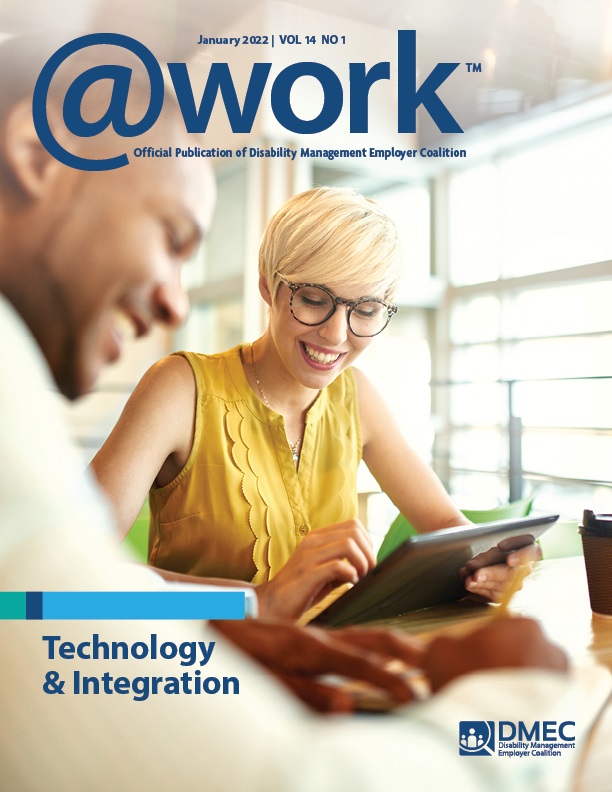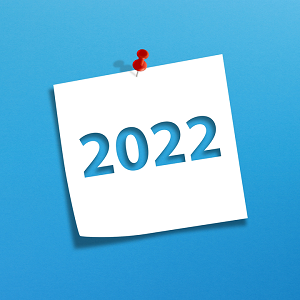
Technology & Integration
January/February 2022
Finding the balance between optimizing technology to improve efficiencies and ensuring employees feel heard and cared for is increasingly important for employers. This issue of @Work magazine shares guidance for how employers can select and integrate technology to support the work of absence professionals, streamline leave administration tasks, and expand access to health and wellness offerings while creating more time for personal and meaningful interactions with employees.
The CEO’s Desk
Technology & The Human Equation
Technology is an integral part of our lives. It’s a valuable tool that can improve efficiency and help you find time for meaningful interactions with employees who need guidance. However, this issue highlights the need to avoid relying solely on technology as it won’t serve you — or your employees well — without a human touch. Read more.

Features
An Employer’s Guide to the Technology Solution Galaxy
Employers are laser-focused on increasing efficiency and employee engagement. Technology can help achieve these goals by creating streamlined processes for leaves of absence, making pertinent information more readily available and digestible for employees, enabling the integration of data and processes, addressing behavioral health issues, and enhancing productivity tracking and reporting. Read more.

Balancing the Yin and Yang of Integrated Disability and Absence Management: Best Practices and Trends
Achieving equilibrium between tried-and-true best practices and emerging industry trends in integrated disability and absence management can be challenging. Layers of complexity create friction so it is useful to understand how to adopt an emerging trend while maintaining established processes. Read more.

Spotlight Articles
Program Showcase
Weighing In on Electronic Performance Monitoring
Electronic performance monitoring, which helps employers observe, record, and analyze job performance, is increasingly popular, and can help managers assess staff needs as well as improve productivity. However, employers should consider potential personnel costs and adjust monitoring approaches to avoid or mitigate these issues. Read more.

Employer Perspective
Remote Workers: Out of Sight, But Not Out of Mind
Like many healthcare organizations, Temple Health did not have an established tradition of remote work at the onset of the pandemic. That paradigm shifted overnight when, within two weeks, non-patient-facing staff from legal, technical, administrative, information technology, and human resources departments, was required to work remotely. Read more.

Program Showcase
Finding “Magic” in the Claims Mix
Most disability cases — occupational and nonoccupational — resolve normally without intervention. But 10% to 15% of cases need additional attention to avoid becoming long-term claims. Organizations have developed tools — from simple paper-and-pencil lists to artificial intelligence (AI) applications — to identify potential outliers early in the process. Read more.

Expanded Perspectives:
@Work to Share
DMEC provides the following @Work magazine articles and podcast episodes to offer additional perspectives on and increase awareness of integrated absence management trends and challenges. The resources — available to members and nonmembers — can be shared with your colleagues and through social media channels.
2022 Trends
A 2022 Spotlight on Absence Management Trends
It is fair to assume that the employment disruption we have experienced during the last couple of years will continue in 2022. But with two years of experience under our belts, we should be able to anticipate some of the twists and turns ahead. One common thread amid the uncertainty we have faced is that the role of absence management professionals continues to expand in scope and influence. Read more.

Can Employers be Liable for Vaccine Side Effects — Or for Not Requiring Vaccination?
Some employers are required to enact a mandatory vaccination policy for COVID-19, and others are choosing to do so. In this environment, employers question whether they can be held liable for vaccine side effects if they mandate the vaccine, while lawsuits have also been filed against employers for failing to protect employees and their family members from the virus. Read more.

DMEC Podcast
Does Electronic Performance Monitoring Help or Hurt Employers?
While there’s a common belief that electronic performance monitoring (EPM) can improve productivity, this podcast provides a human resources perspective on the technology while weighing its benefits and detriments. EPM can have significant benefits for employers “when used with a degree of balance,” explains Coy Hillstead, EdD, DMEC member, in this episode. Listen.
Columns
Absence Matters
Technology: A Key to Better Service
Technology and innovation are critical to building and maintaining an efficient and compliant claims practice. The automation of simple eligibility determinations, communications, and integrated processes can be a game changer for the health and longevity of a successful program. Read more.

Integrated Absence Management
Hybrid Enrollment: What We’ve Learned and What’s Here to Stay
The shift toward remote work has created more flexibility for employees and opportunities to work for companies outside their local areas. This rapidly changing workforce creates a need for continual education for new employees and ongoing enrollment options. Read more.

Engaging Today’s Workforce
An Ongoing Shift to Telehealth: Considerations for Employer Benefit Programs
72% of employees say their health, safety, and protection, as well as that of their families, is more important than ever before. Technology innovations such as telehealth, which enable employees to access care from anywhere, help them meet their health goals. Read more.

Employer Solutions
Balancing Technology and the Human Touch for Employee Leaves
The need for leave is purely human. Yet the process isn’t always as human-centered as we’d like it to be. As employers outsource their disability and leave administration, they need to assess whether their vendor partners combine predictive analytics with automation to ensure employee leaves are handled with clarity as well as compassion. Read more.

Common Sense Compliance
Technology Helps Employers Meet Business Needs and Ensure Privacy
Technology solutions can make remote training more engaging, interactive, and even entertaining. Emerging services and technologies help employers manage an increasingly remote workforce securely and ensure compliance with federal, state, and local laws. Read more.

Featured Case
Responding to Vague FMLA Requests
FMLA regulations require employees to provide notice of leave to employers. Those seeking leave for the first time do not need to reference the FMLA but must provide sufficient information to demonstrate it is necessary. Recent court cases illustrate the need for employers to reevaluate leave request processes and provide clear guidance on criteria that substantiates requests. Read more.

Leave Technology
Tailoring Technology for Small Employers
Several software solutions have been introduced to help employers manage the complexities of leave and accommodation requests. Initially catering to larger employers, vendors soon recognized a need to create solutions for small- and medium-sized businesses with fewer than 1,000 employees that were affordable and simple to operationalize. Read more.

The Disabled Workforce
Using the Technology on Hand to Create Systems That Work
Up to 11% of employees in the U.S. are applying for vaccine exemptions, and many employers do not have the knowledge or capacity to manage the volume of requests. While some organizations will outsource this work, many won’t have that luxury. However, it’s possible to leverage the technology on hand to improve efficiency. Read more.

DMEC RESOURCES
DMEC News
As we enter 2022, DMEC prepares to launch our second microcredential course on FMLA medical certifications and welcomes four new Employer Advisory Council members and two new National sponsors. Read more.

Legislative Updates
Check out the latest federal, state, and local compliance updates on the DMEC Legislative Updates. Recent posts cover the U.S. Supreme Court’s rulings on the Centers for Medicare & Medicaid Services and the Occupational Safety and Health Administration COVID-19 vaccination rules. Read more.
Be sure to follow DMEC on Twitter, Facebook, and LinkedIn for additional insight & up-to-date news.

Continue the Conversation
Share insights and ideas around the Technology & Integration issue with other DMEC members in the DMECommunities Technology Solutions group. DMEC’s online networking groups give you the opportunity to connect with industry peers, ask/answer questions, share resources, and seek feedback. Get started.


@Work™ magazine is the official publication of the Disability Management Employer Coalition. Copyright© 2022, Disability Management Employer Coalition (DMEC). All rights reserved.
Editorial Policy
The goal of @Work is to present industry and Association news, highlight member achievements, and promote the exchange of specialized professional information. The statements and opinions expressed herein are those of the individual authors and do not necessarily represent the views of the Association, its staff, board of directors, or its editors. Likewise, the appearance of advertisers does not constitute an endorsement of products or services featured in this, past, or subsequent issues of this publication. DMEC makes no representations, warranties, or assurances as to accuracy of the information contained in the articles, and no content herein is legal or tax advice. Consult appropriate professionals for legal or tax advice.
Editorial Staff
Editor: Heather Grimshaw
Editorial Advisory Group: Linda Croushore, Rebecca Fisco, Steven Genduso, Jenny Haykin, Terri Morris, Fred Schott, Jessica Thornton, Lori Vickory






